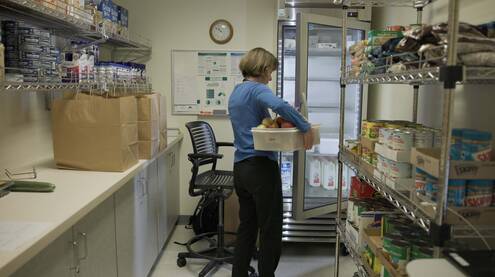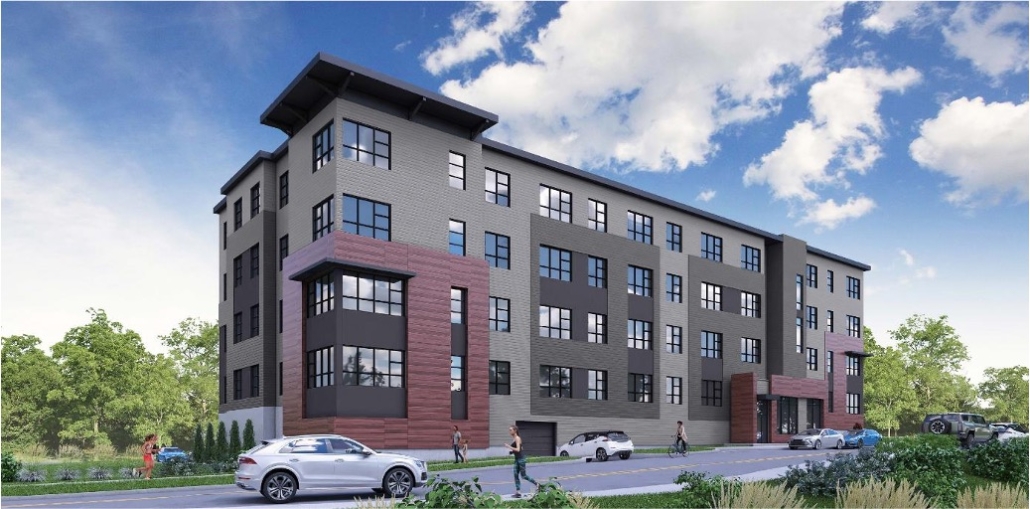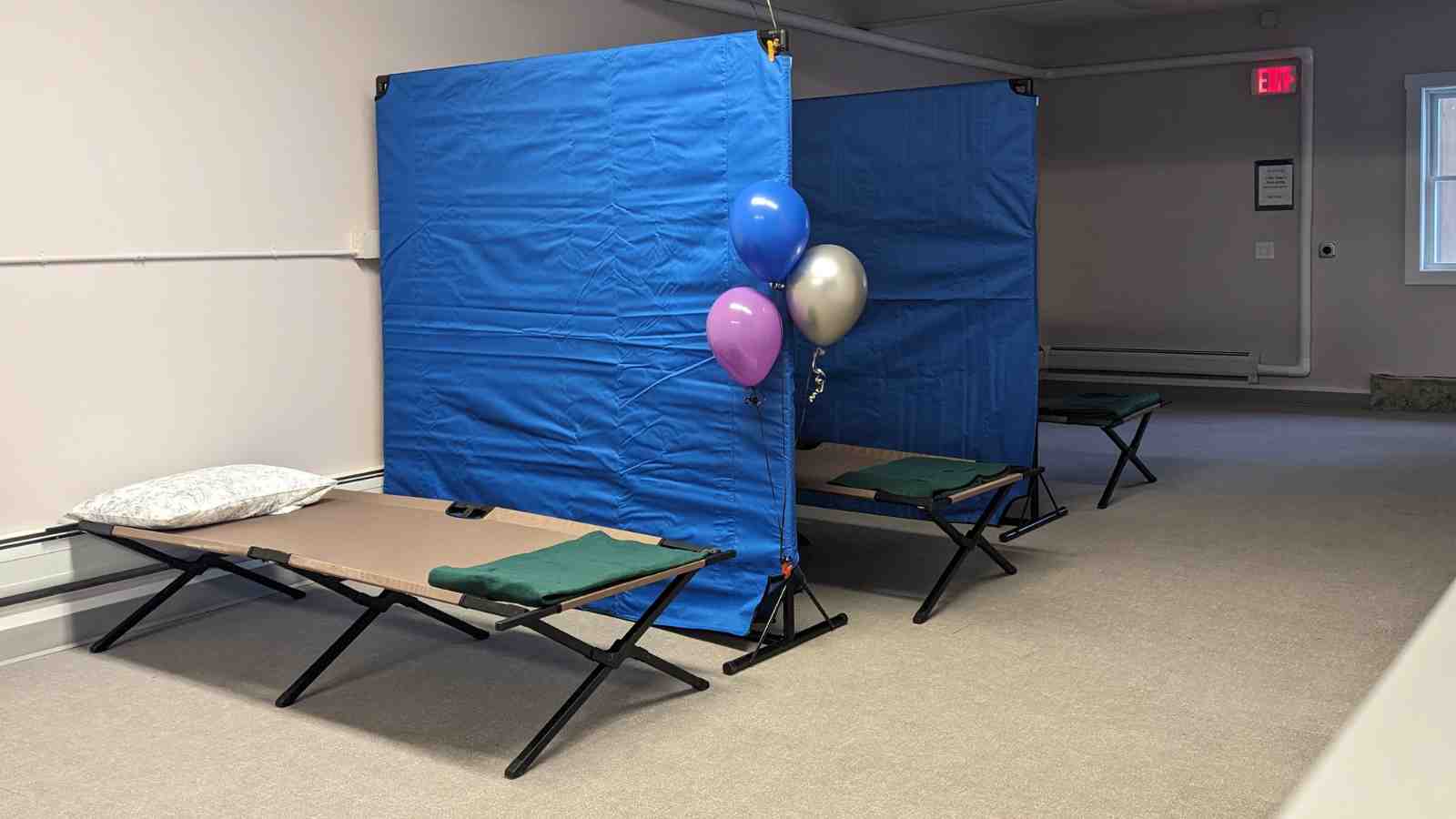
Helping members of our community extends beyond providing world-class healthcare. Read about these impactful local and state initiatives that are working to address housing, homelessness, food insecurity, and public health.
Increasing housing
The $9.5 million Upper Valley Loan Fund was incubated by Dartmouth Health and Mascoma Bank, with the help and support of other local businesses. Dartmouth Health has committed $3 million to this loan, which is managed by Evernorth, a development firm in Burlington, Vermont that specializes in affordable housing in the region. The fund has now made four commitments totaling $3.7 million for four different housing projects in White River Junction, Vermont; Windsor, Vermont; and New London, New Hampshire. These projects will create 192 apartments in the Upper Valley region. 169 of them will be affordable to those with incomes below 80% of the average median income (AMI); 53 units will be affordable to households below 50% of AMI; and 22 units will be affordable to households above 80% of AMI.

Empowering homeowners
In 2023, Dartmouth Health became the largest in-state investor of New Hampshire Community Loan Fund, contributing a combined $5 million to support affordable, safe housing. The Community Loan Fund provides financing and education to help homeowners in manufactured-home communities purchase and run their parks as resident-owned communities (ROCs). It also offers fair, 30-year, fixed-rate manufactured-home mortgages to low-wealth homebuyers; and it lends to developers of affordable multifamily rentals. The Community Loan Fund has a strong record of helping manufactured-home residents convert to ROCs and take ownership of their financial futures.
“Access to safe, affordable housing is an important driver of personal health and healthy communities,” says Sally Kraft, MD, MPH, Dartmouth Health Population Health Officer. “Investing in housing solutions provides health benefits to people and helps our communities thrive.”
Food access for cancer patients
In early 2022, Dartmouth Cancer Center Continuing Care Manager Catherine M. Reed, MSW, realized that food insecurity was a serious issue among her cancer patients. As part of its efforts to address community health needs, Dartmouth Health’s Population Health team provided consultation and start-up funds for Reed to launch a six-month Dartmouth Cancer Center Food Pantry pilot program in February 2022. The pilot study's 150 patients were given a week's worth of food every two weeks that catered to their specific nutritional needs. The personalized bags were brought to meet patients at their cars following treatment.
Today, with the assistance of a registered dietitian and support from the Friends of Dartmouth Cancer Center, they aim to expand the program to serve all 2,000 cancer patients in need with greater quantities and variety of foods available.
Shelter in winter

On January 25, 2024, the City of Lebanon, NH, opened its new Emergency Winter Shelter for those in need. With funding from donors, including a $25,000 gift from Dartmouth Health, the shelter provides a haven for up to 15 individuals during the winter months. This initiative not only addresses immediate needs but also aligns with broader city goals, including supporting unhoused individuals in the ways necessary to eventually secure and hold housing.
In addition to protecting individuals from the winter elements, the shelter also provides volunteers an opportunity to help those in need to consider their futures and connect to essential community services. Shelter guests are referred to service coordinators who can assist with housing plans. Some guests are able to secure housing by the time the shelter closes for the season.
Public health advocacy
The voices of everyday citizens are critical to shaping the future of our region, including advocating for policies that advance the health of all residents. For example, Dartmouth Health’s Project ECHO (Extension for Community Healthcare Outcomes) free, virtual educational series examines legislation and executive action on key current issues, and educates participants on engaging in advocacy. Project ECHO topics include Workforce and Economy, Patient Choice in Healthcare, Public Health Systems, Digital Health Equity, and Workplace Violence.
The series offers the opportunity for anyone interested in the health and prosperity of New Hampshire communities to learn about key current policy proposals that may impact health determinants, and to advocate effectively for sound public health policies.
Legal services for families
Many families cannot afford legal help to address their complex health and social needs. The Medical-Legal Partnership Program, administered by Dartmouth Health and New Hampshire Legal Assistance, focuses on identifying health disparities in communities and addressing individuals’ unmet legal needs related to social conditions. Some examples might be ensuring emergency access to insurance benefits, preventing employment and education discrimination, or securing housing and preventing unwarranted and illegal evictions. In January, the program received an additional two years of funding from the New Hampshire Charitable Foundation and the Couch Family Foundation.
“Families are faced with many hardships, impacting their health,” says Holly A. Gaspar, manager of Dartmouth Health’s Department of Population Health and medical-legal partnership program manager. “Rather than fear of the legal system, patients receiving this service feel supported, listened to, and successful at navigating the next steps.”
This article first ran under the title of “Community Support” in the March 2024 Issue of Connections Magazine.